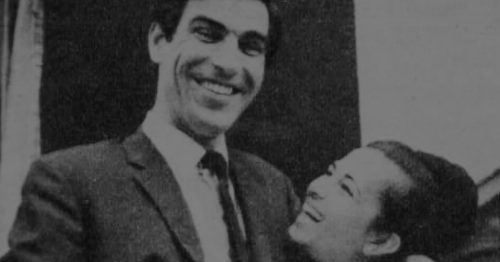Plain speaking
A speech by the chairman of Granada to the Manchester Reform Club in 1962


THERE is no place like the North for plain speaking. Argument thrives here as it has always done. Can it be something in the air?
I ask because the top brass of the BBC, who but for the flick of a switch would be called “tycoons”, seem to find it particularly heady.
It begins to loosen their tongues as soon as they step off the Pullman from London.
This is quite understandable, of course. They are never here long enough to get used to breathing it as the rest of us are. Nevertheless, we at Granada are still sometimes surprised at the things they say.
There was, for example, that remarkable speech by Mr. Hugh Carleton Greene, the BBC’s Director General, when he paid one of his infrequent visits.
What else but the Manchester air could be blamed for his unhappy attempt to prove that only the BBC can provide worthwhile regional broadcasting in the North — when all the evidence pointed in the exactly opposite direction?
We do not mind being attacked by the BBC, but we believe that deliberate distortion of the facts should not be shrugged off. Television is at too crucial a stage in its development for misinformed comment to be left unanswered.

The BBC television service claims to be regional, but their vast acreage at Shepherd’s Bush is evidence of an overwhelming focus of effort and resources in London.
In fact, their headquarters in this part of the world are a somewhat cramped studio in a back-street — a converted church.
Recently, Mr. Greene’s programme controller, Mr. Stuart Hood, told a Manchester audience: “Britain is not centred on London, but has strong local life.” How right he is!
But if he really wants to be regional, he should try to get the BBC’s architects on his side and divert some of the bricks and mortar from London to the North.
For the truth is that their paper plans for building new television studios in the North have remained — on paper. Granada, in contrast, has cut away from the South and built all its new studios here.
Does it make much difference where a television company has its studios? Of course it does!
The first essential of good regional television is an iden tity of interests between the people producing the programmes and the people who watch them. The programmes acquire a natural and sustained vigour from this.
But how can that kind of identification be achieved if the studios and the audience are separated by a gap of hundreds of miles and several counties? Could Coronation Street have been produced by Granada from the South? Or People and Places?
Isn’t it significant that the BBC did no Northern news bulletins and Northern sports programmes on television until Granada led the way?

Of course, most Granada programmes are seen all over the country, just as we here in the North see programmes produced from other companies. This is called networking.
But our five acre TV Centre in Manchester is the focus of many more programmes designed for the North alone. We believe we have now become part of the life of the North, and our TV Centre is tangible evidence of our honouring the original concept of independent television.
Derek Meakin writes…
ONE observation made by Mr. Stuart Hood, in the speech referred to by Mr. Bernstein, has become a top talking point among BBC and ITV personnel in the North.
He said: “In regional terms we give insufficient attention, and insufficient time, to the coverage of local affairs, which is, I believe, the field in which regional television has still got a long way to go.”

The general reaction to this remark was summed up for me by a man who has worked for both channels — Ronnie Taylor, now ABC Television’s Head of Light Entertainment, who started with the BBC in 1949 and moved to ABC two years ago.
He told me: “This is an unexpected admission by a member of the BBC hierarchy. As far as the North — which is the largest region of all — is concerned, it has taken them 11 years to get around to this way of thinking.
“I well remember the unique opportunity the BBC had to pioneer regional television when the North’s first TV transmitter was opened at Holme Moss in 1951.
“But what happened? The transmitter became little more than an automatic relay station re-broadcasting programmes received from London.
“Then, when ITV began in the North just six years ago, we all expected that the BBC would react to competition by giving a fair measure of autonomy to its Northern operation.
“But the grand hopes held by Northerners working for the BBC were not to be realised. In fact, they have continually met with frustration and opposition.
“People at the London end of the BBC have gone out of their way to see that the regions have not had the chance to develop.
“ABC and the other regional companies are in business to provide regional television. And this is why I am now so happy working for ABC.”
According to Mr. Hood, local affairs is the field “in which regional television has still a long way to go.”
But it has gone far already — on the independent channel. The facts speak for themselves.
For instance. Granada pioneered regional news bulletins and now gives two every weekday. With its Saturday-night Northern News Desk ABC is the first company to provide a regional weekend news bulletin.
In People and Places, Granada brings before the cameras a constant stream of interesting personalities who belong to the North or who are visiting the region.
ABC at Large is regularly praised by the authorities for its courageous treatment of regional problems.
That viewers like these programmes is graphically shown by audience figures.
People and Places is seen in 671,250 more Northern homes than its BBC equivalent, Tonight. And ABC at Large, although it is shown very late in the evening, attracts a Northern audience that is greater by 242,000 houses than the one that watches the BBC’s peak-hour Panorama.



